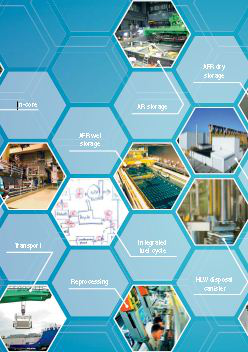Speaker
Dr
Chang Hwa Lee
(Korea Atomic Energy Research Institute)
Description
Zirconium (Zr)-alloys such as Zircaloy and Zirlo have been widely used as cladding tube materials for nuclear fuel assembly due to its low absorption cross-section to thermal neutrons, high hardness, ductility, and corrosion resistance. The Zr-alloy cladding hull wastes are expected to be generated from the pretreatment step of recycling technologies such pyroprocess or of long-term storage technologies for used nuclear fuel. In the case of PLUS-7, which is a fuel assembly used for Korean standard PWR, the amount of the cladding hull waste will reach about 2.5 tons for the treatment of 10 tons of used nuclear fuel. In addition, the waste level will supposedly exceed an intermediate-level due to the fuel residue on the surface, fission products by pellet-cladding interaction (PCI), and irradiation by neutron.
In this regard, this paper demonstrates Zr electrorefining process for the treatment of cladding hull wastes, thereby minimizing the amount of intermediate-level waste and recycling the recovered Zr. The Zr electrorefining has been mainly studied for LiCl-KCl based molten salts. However, a powder-type deposition characteristic of Zr in chloride-based molten salts is regarded as an obstacle for the realization of electrorefining process for a commercial-scale hull treatment because of significant salt incorporation in the deposit. On the other hand, all-fluoride based salts are known to form a coherent or dendritic Zr, which is preferred for a high throughput Zr production. However, there exist several challenges associated with high corrosivities, salt waste treatment, etc. Therefore, we examined the electrochemical behavior change of Zr in chloride-based molten salts by adding fluoride compounds. Also Zr electrorefining experiments were performed to investigate the morphological feature of Zr deposit in the mixed chloride-fluoride molten salts.
Country/ int. organization
South Korea/Korea Atomic Energy Research Institute
Author
Dr
Chang Hwa Lee
(Korea Atomic Energy Research Institute)
Co-authors
Mr
Deok Yoon Kang
(Korea Atomic Energy Research Institute)
Dr
Geun Il Park
(Korea Atomic Energy Research Institute)
Dr
Kweon Ho Kang
(Korea Atomic Energy Research Institute)
Dr
Min Ku Jeon
(Korea Atomic Energy Research Institute)
Mr
Yong Taek Choi
(Korea Atomic Energy Research Institute)

